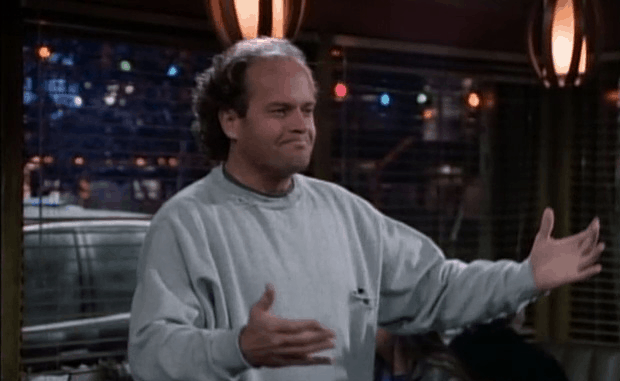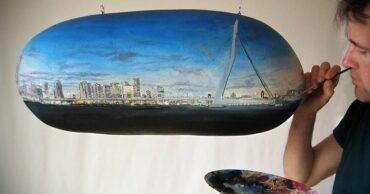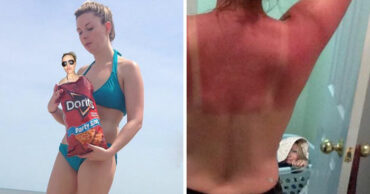
With such a strong thoroughline of family reconciliation running through the first ten episodes of Frasier, it would be easy for the writers to make “Miracle on Third or Fourth Street” a simplistic, pat-on-the-back story about family and togetherness and the ‘true’ meaning of Christmas, blah, blah, blah. Instead of being about family – or even self, for that matter – Frasier‘s first Christmas episode is about humanity, and how the holidays are an important reminder both of our own mortality and the kindness of others that makes this whole ‘civilization’ thing work.
And its story springs from such innocuous beginnings; after Frasier gets into a shouting argument with his father over Christmas decorations (spurned by Frasier’s anger that Frederick wouldn’t be coming to visit for the holiday), Frasier decides he’s going to spend the holiday alone, filling in for Bulldog at the station (and in the process, inadvertently ruining Roz’s Christmas). However, Christmas isn’t just a religious holiday, or an excuse for consumerism; it is a holiday about family and tradition, both of which go out the window when cranky Frasier decides to spend Christmas alone.
It goes as terribly as you might imagine; with depressing phone calls on the radio filling out the long, boring hours of his day, Frasier lets Roz leave early, leaving Frasier as the show’s only remaining, recognizable character still in Seattle for the holiday. With the station barely operating and every eatery in town either booked or closed, Frasier – dressed in torn sweatshirt and raggedy jeans – finds himself eating Christmas dinner at a local diner, ordering up a plate of turkey log (and yule log!), and enjoying the company of a few local homeless men. There aren’t a lot of jokes or outlandish moments; Frasier simply enjoys a meal with one of society’s forgotten, and then leaves to go home to his empty home, to end his holiday on a quiet, peaceful note.
That is, until he realizes he’s forgotten his wallet at the office: and when the others in the restaurant realize this, they take up an offering among the other homeless to help pay for his dinner. While the assumption that the well-spoken, recognizable face of Frasier Crane could be mistaken for a homeless man is a bit of a stretch, the emotional crux of the episode comes shining through in that moment; while we may not always have our biological family around us during the holidays, we’re always surrounded by our larger family of humanity, which tends to get a little kinder around Christmastime. While Frasier insists that he can pay, the others refuse to hear it, the men and women in the diner offering up what change they have so Frasier can have a ‘nice’ meal, telling him that the other 364 days of the year are for “the rich.”
The diner scene is a powerful one, even without being the focal point of the entire episode; had “Miracle” opened with this scene, the farcical behavior that ends the episode may have ended up dominating the proceedings. However, placed at the end of the episode, the moment becomes a coda of sorts from the writers to the viewers; if we don’t take care of our fellow people (and vice versa), no matter how high or low on the societal totem pole they may be, there’s no hope for any of us. A satisfying resolution is hard to find in life, and Frasier’s Christmas dinner offers him an opportunity unseen through the rest of the hour: he can escape the depression he’s settled into since hearing about his son’s trip to Austria, and allow the downtrodden members of his city lift his spirits in a critical way.
How “Miracle” reaches this moment is impressive; the slow isolation of Frasier from his family and friends is meticulously crafted to stage that final scene, which walks the fine line between resonant and cheesy in equally admirable fashion before dipping into silliness in the final two minutes, when Frasier tries to exit quietly in his Lexus without anyone noticing. Christopher Lloyd’s script (his second of the series, following “I Hate Frasier Crane”) reaches this moment quietly, only showing its hand once, when Frasier inexplicably arrives to the office dressed in torn, ratty clothing (which they try to explain through Roz, but awkwardly). The farther it moves from Frasier’s normal world and social circle, the less humorous things get, until Frasier’s walking the streets of Seattle alone, disillusioned by the plethora of depressing phone calls, and finding hope in those whose lives are permanently more conflicted and sad than his own.
That sentiment, while a simplistic one, is beautiful, and it gives emotional weight to an episode that is severely lacking in it comedically, and in surprisingly subtle fashion. There are no ‘wink, wink’ moments to the camera, or expositions overtly explaining the themes of the night; the episode simply ends on that diner scene, its funniest moments coming in its final seconds, while Frasier tries to navigate his way back into the restaurant to get his car keys back. He doesn’t, of course (Frasier refusing to grant us even the simplest of resolutions, in a smart move), and walks out into the night with a sheepish smile on his face, able to appreciate the irony of his situation, and heading home with a little more faith in the world than he had a few hours earlier. The simplicity is where the power of that message springs from; and as a concluding note to Frasier‘s first big Christmas episode, it’s a somber, poetic way to tell a story about togetherness and its importance.
Other thoughts/observations:
– Niles having Daphne wear dresses he “bought” for Maris is a few shades too creepy for me.
– Father Mike tries to recreate the nativity scene during the office party, a hilarious throwaway joke I wish they’d follow up on.
– Maris shoots shotguns? At animals?
– Frasier examines his meal at the diner: “He didn’t exactly dally over the remoulade.”
– Eddy drinking Niles’ coffee is a great visual gag, one that doesn’t show up in Frasier highlights enough.
– Marty, on the phone: “It’s the nag.” Frasier: “Hello, Lilith.”
[Photo via NBC]
 Follow Us
Follow Us





